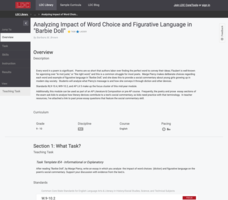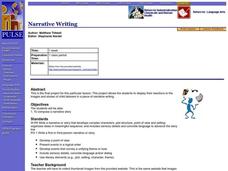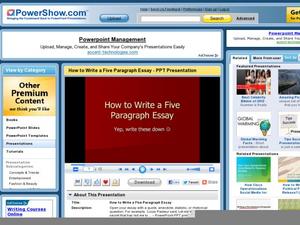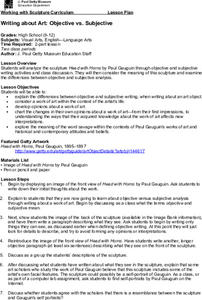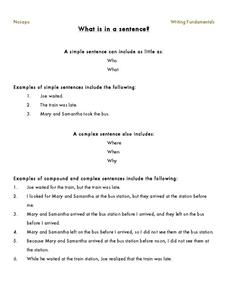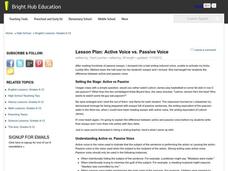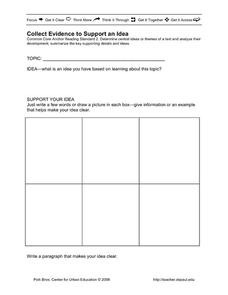Curated OER
Changing Seasons
Explore expository writing and using precise language in this descriptive paragraph writing lesson plan. Learners brainstorm prior knowledge about the changing seasons in Ohio. They describe seasonal items, view seasonal pictures from...
National Endowment for the Humanities
A “New English” in Chinua Achebe’s “Things Fall Apart”: A Common Core Exemplar
To examine the “New English” Chinua Achebe uses in Things Fall Apart, readers complete a series of worksheets that ask them to examine similes, proverbs, and African folktales contained in the novel. Individuals explain the meaning...
Curated OER
Descriptive Writing: Using Art to Inspire description
Write with the senses! Try using art to inspire writers to consider all of the senses. Here, the class is divided in half. Each group looks at one of two images, imagines the senses that would be engaged, and records answers to five...
K12 Reader
What Would You Change About Your School?
Have your young writers speak their minds with a letter to the principal. Using a writing prompt at the top of the page, kids think about a change that they would like to see at their school. The prompt encourages them to consider...
Curated OER
Aztec Myths: Writing Editorials
Middle schoolers write an editorial giving an opinion of whether or not Quetzalcoatl has arrived and if so, what the Aztecs should do. They discuss whether or not they believe Quetzalcoatl is a god or a man, and use an Editorial...
Literacy Design Collaborative
Analyzing Impact of Word Choice and Figurative Language in "Barbie Doll"
After a close reading Marge Piercy's poem "Barbie Doll," class members craft an AP®-style explanatory essay in which they analyze the diction and other figurative literary devices the poet employs to deliver her commentary on modern...
Curated OER
Lesson Plan 12: Writing With All Your Senses
What does an ice cream sundae sound like? Challenge young writers to move beyond visual descriptions and craft details that appeal to all five senses. The examples provided by the script in this resource show pupils how to create rich...
Curated OER
Narrative Writing
Imagine a day in the life of a child who has to work 12-14 hours a day, seven days a week. After viewing images and reading stories of child laborers, class members select an image and write a richly detailed narrative about a typical...
Curated OER
Writing Process-- Revision and Editing
As guided practice, class members work together to revise a model persuasive paragraph. Then they practice independently with their own writing. The included rubric looks at prewriting, drafting, revising, editing, nonfiction text...
Curated OER
Descriptive Writing: Parrot in the Oven
After reading a selection from Victor Martinez's Parrot in the Oven, pupils use the graphic organizer to decipher the sensory details within the descriptive paragraph. They list various details under the appropriate sense ("see," "hear,"...
Curated OER
Putting It All Together: Revision
Use the revision process to polish your writing. Writers prepare works for job portfolios that include cover letters, job applications, resumes, and letters of recommendation. Prepare them for the future!
Curated OER
Visible Speech: A Short Course in the Fundamentals of Writing
Use this presentation to introduce a class or lecture about writing organization. The slide show is the first part in a five-part series, titled "What is an Essay?" The slideshow is short and could use more detail, but functions as a...
Curated OER
How to Write a Five Paragraph Essay
What are the necessary components of a five paragraph essay? How does one interest their reader? These questions are answered with this 12-slide PowerPoint which details components of the introduction, body paragraphs, and conclusion....
Curated OER
Visible Speech: A Short Course in the Fundamentals of Writing (Lesson 5)
Of these five slides, two consist of the title and directions; the other three list the parts of an essay and their purpose, as well as how to best begin an essay. In essence, this is a very brief PowerPoint that can be used as a...
Dream of a Nation
Read, Watch, Write for Pathos, Logos and Ethos
Encourage your young citizens to make a difference. Using Tyson Miller's Dream of a Nation: Inspiring Ideas for a Better America as a starting point, class members watch documentaries, investigate issues, and then write letters to...
Curated OER
Writing About Art: Subjective vs. Objective
Explore objective and subjective writing in this interdisciplinary lesson, which brings language arts and visual art together. Middle and high school young scholars examine the sculpture Head with Horns by Paul Gauguin. They then analyze...
Curated OER
Writing Myths I
Explain a natural phenomenon in an original myth. After researching the phenomenon they have chosen, young readers use factual information to include in their myth. They find synonyms and new phrases to create vivid images as they write...
Nosapo
What Is in a Sentence, Paragraph, and Story?
Language arts is made up of many parts. Learners review the parts of a sentence, as well as how to make a simple sentence into a complex sentence, before examining full paragraphs and identifying the topic, body, and concluding sentence...
EngageNY
Grade 9 ELA Module 4, Unit 1, Lesson 12
Anna McMullen's opinion piece "Bangladesh Factory Collapse: Who Really Pays for our Cheap Clothes?" offers readers another opportunity to examine how writers craft and support their arguments. After reading McMullen's article, class...
Curated OER
Active Voice vs. Passive Voice
Can your class tell the difference between passive and active writing? Use this lesson in your writing conventions unit. The lesson prompts middle schoolers to create essays, demonstrating understanding of an active versus passive voice...
Curated OER
Like Water for Chocolate: Family Tradition
Engage young writers in family tradition with this writing assignment for Like Water for Chocolate, by Laura Esquivel. Using sensory details, learners write a narrative about a family tradition involving food. Scholars also talk with...
Polk Bros Foundation
I Can Identify a Nonfiction Writer's Main Idea and Supporting Examples
Use this page to quickly identify the central idea of a text and organize ideas for writing an informational or explanatory text. The worksheet is split into two parts. In the first part, pupils note down the main idea and supporting...
Polk Bros Foundation
Collect Evidence to Support an Idea
In order to support an idea, writers must use evidence. Your class members can prepare their evidence with this basic worksheet. Writers note down the topic they are learning about and their own idea. Next, they come up with information...
Curated OER
"Sunday in the Park" Reader's Response
After reading Bel Kaufman's "Sunday in the Park," give your class the opportunity to react to the short story through writing. First they write a brief summary paragraph, and then they react to any events or characters' actions in a...
Other popular searches
- Sensory Details in Writing
- Elaborate Details in Writing
- Concrete Details in Writing
- Descriptive Details in Writing
- Using Details in Writing
- Specific Details in Writing
- Literacy Details in Writing
- Details in Writing Pictures
- Vivid Details in Writing
- Supporting Details in Writing







